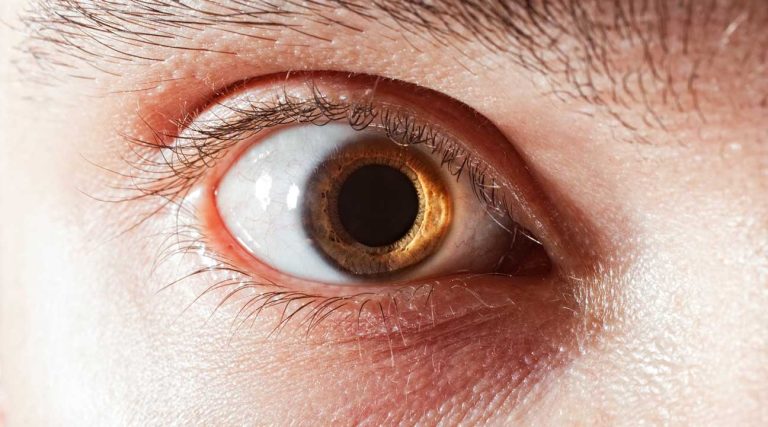Cocaine Eyes | Cocaine Pupils | Signs & Symptoms

Cocaine is a powerfully addictive stimulant that can damage your health, change the structure of your brain, and trigger sudden and fatal heart attacks, strokes, or seizures. Cocaine substance abuse can also have significant short-term and long-term effects on your eyes and vision.
What Are Cocaine Eyes?
Cocaine causes the pupils of the eye to dilate (grow bigger) after taking the drug. This sharply increases sensitivity to light, and many who take cocaine will use sunglasses in odd situations to hide their eyes and filter out bright light as a result.
Cocaine eyes may also be red or bloodshot due to expanding blood vessels and irritation from cocaine vapors. Eye movements may be noticeably irregular or unfocused until the drug’s effects wear off.
Cocaine Pupils
Cocaine is a stimulant drug that works by increasing levels of the neurotransmitters dopamine, norepinephrine, and serotonin in your brain for a short period. This triggers the brain’s reward circuit and supercharges emotions and motivation.
Elevated levels of dopamine and endorphins (pleasure hormones) can cause a wide range of effects including dilated pupils, blood vessel constriction, and increased heart rate.
Benzodiazepines and opioids, including the illicit drug heroin, are central nervous system depressants and have the opposite effect, lowering heart rate and breathing while shrinking pupil size to pinpoints in high doses.
Long-Term Effects Of Cocaine On The Eyes
Depending on the severity of use and route of administration, cocaine can do serious damage to your eyes and vision. Some long-term effects may include:
Jaundice
Long-term use of cocaine damages the liver and can lead to jaundice, or yellow-colored eyes and skin.
Crack Cornea/Keratitis
If cocaine is smoked the fumes and vapors can numb the eye and suppress the blinking reflex, drying out the eyes and exposing them to damage.
These vapors and other foreign particles can then scratch, irritate, and even kill cells on the surface of the eye, leading ulcers, scarring, and permanently blurred vision.
Nystagmus
Nystagmus is a condition of rapid, uncontrolled eye movements in one or both eyes that can interfere with normal vision. Cocaine can cause nystagmus by damaging nerves, muscles, and brain tissue involved in eye control.
Ocular Bone Damage
Snorted cocaine will gradually eat through the septum and other nasal passages, causing perforations and exposing tissues and bones to infection.
Cocaine also decreases the blood supply to these tissues, putting further stress on them and in some cases causing them to deteriorate to the point that your eyes and vision are impacted.
Glaucoma
Due to its effects on blood pressure, those who use cocaine are more likely to develop glaucoma, a leading cause of blindness in the United States. Glaucoma may occur as a result of changes in the body that increase the long-term fluid pressure within the eye.
Talc Retinopathy
When cocaine is cut with talcum powder and is taken by snorting or injection it can result in a buildup or blockage of crystal-like yellow/while magnesium silicate deposits in the retina. These blockages often cause severe health complications including blindness.
Cocaine Addiction Treatment
The best way to avoid lasting eye damage as a result of cocaine abuse is to stop using it altogether. Professional treatment for substance use disorder can give you the tools, perspective, and support to put cocaine behind you.
Personalized treatment and rehab options available for cocaine addiction include:
Medical Detox
This treatment process helps you safely cope with withdrawal symptoms under medical supervision as you come off the drug.
Inpatient/Outpatient Treatment
Depending on your needs and the severity of your case, you may be recommended for intensive 24/7 treatment within a rehabilitation facility, or structured treatment sessions you can attend while continuing to live at home.
Group Therapy
This program takes place in a group setting, giving you access to others going through the same process of recovery from drug use and addiction for the purpose of mutual support and motivation.
Behavioral Therapy
How you think and feel about cocaine use matters, and behavioral therapy helps you examine and adjust those feelings and attitudes. Motivational interviewing is a particularly useful option for cocaine addiction.
If you or a loved one suffers from cocaine addiction, Ark Behavioral Health can help. Please contact us today for more information on our treatment options.
Written by Ark Behavioral Health Editorial Team
©2024 Ark National Holdings, LLC. | All Rights Reserved.
This page does not provide medical advice.
National Center for Biotechnology Information - Ocular manifestations of drug and alcohol abuse
National Institute on Drug Abuse - What is Cocaine?
Review of Optometry - How Drug Abuse Affects the Eye
Questions About Treatment?
Ark Behavioral Health offers 100% confidential substance abuse assessment and treatment placement tailored to your individual needs. Achieve long-term recovery.
100% confidential. We respect your privacy.
Prefer Texting?
Our friendly support team is here to chat 24/7. Opt out any time.







 Learn More
Learn More








